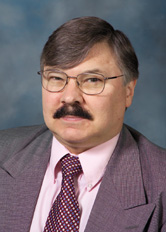 Jim Medder, M.D., admits he doesn’t like being interviewed much, and he’s exceedingly humble when asked about his service to the community. If one looks at his accomplishments or speaks to his colleagues, however, it becomes obvious that Dr. Medder’s work in the community speaks volumes.
Jim Medder, M.D., admits he doesn’t like being interviewed much, and he’s exceedingly humble when asked about his service to the community. If one looks at his accomplishments or speaks to his colleagues, however, it becomes obvious that Dr. Medder’s work in the community speaks volumes.
For his work, Dr. Medder is being honored with the second annual Spirit of Community Service Award. Dr. Medder will receive his award on Wednesday, April 20, at the Annual Faculty Meeting. The meeting will begin at 4 p.m. in the Durham Research Center auditorium.
“There are always other people who seem to be doing more. In that sense, you’re always surprised when you receive something like this,” said Dr. Medder, an associate professor in the Department of Family Medicine. “That doesn’t mean I don’t think what we’re doing is really good. I really think that we’ve done some great things.”
Those accomplishments center on Dr. Medder’s involvement with the SHARING (Student Health Alliance Reaching Indigent Needy Groups) movement. Begun in 1997 with the formation of the weekly SHARING Clinic in south Omaha, the SHARING movement has grown to three clinics serving the underserved. Other clinics include the weekly RESPECT Clinic in south Omaha for patients with sexually transmitted diseases, and the once-a-month GOODLIFE Clinic in north Omaha for patients with diabetes.
“Through his work in sponsoring our student-run outreach clinics to the communities of South and North Omaha, Dr. Medder has helped provide for the medical needs of hundreds of indigent patients, and has fostered student learning for our health care professional students in several colleges,” said Paul Paulman, M.D., a family medicine professor who nominated Dr. Medder for the award.
Dr. Medder said the idea for the SHARING Clinic came from a student who saw the need for better care of underserved populations. Together with a few students, Dr. Medder and Kathryn Fiandt, D.N.S., a nurse practitioner and associate professor in the College of Nursing, began the SHARING movement. The first clinic evening was Sept. 9, 1997.
Since then, on nearly every Tuesday for nearly eight years, patients have been treated at the SONA building, 5211 S. 31st St. Upon entering the clinic, a patient is examined and diagnosed by either a nurse practitioner student, medical student or physician assistant student. The student then consults with a pharmacy student and discusses the findings with a physician or nurse practitioner supervising the clinic. The patient is then treated. The patient may also require lab work, which is done by clinical laboratory science students. All of the students have a professional in their field to supervise all of their work.
Patient appointments are encouraged, but walk-ins are accepted and every patient is seen whether-or-not they are able to pay the requested contribution of $10 per visit.
Without question, Dr. Medder said, the clinic has served patients who otherwise would have gone without treatment.
“These clinics have made a significant difference in the lives of those patients who have been seen,” Dr. Medder said.
The clinic has several effects on the students who serve it, as well. For one, they are able to examine and diagnose patients much more independently than they do at many preceptors’ clinics. In addition, many see for the first time the struggles that patients go through to receive health care, particularly in receiving prescription medications.
“At the clinic, the students take histories, they perform the exams, they consult with other health care providers – tasks that they sometimes don’t get to do with preceptors,” Dr. Medder said. “They also are there because they want to serve, and I think that they see that there are people who many times go without appropriate health care.”
Dr. Medder’s primary responsibility as a faculty member is to teach, and he directs the second year of medical students’ Integrated Clinical Experience (ICE). He especially enjoys students in their first and second years, he said, because they’ve yet to be jaded by some of the realities of practicing medicine. Dr. Medder also spends two half-days in clinic, and he particularly enjoys his half-day at the SONA Clinic, he said.
“The patients at the SONA Clinic are very thankful for everything you can do for them,” Dr. Medder said. “Even though many of them face great adversity, they’re always appreciative.”
In his free time, Dr. Medder enjoys science fiction books and movies, as well as fixing up his home and doing some computer programming.